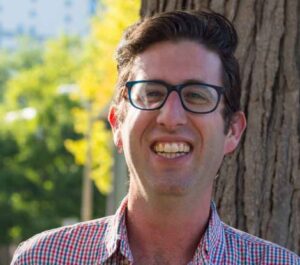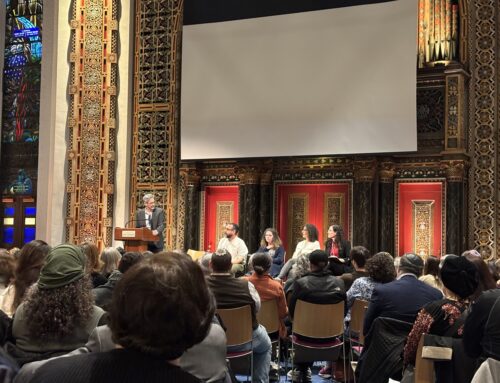INSIGHTS
A Movement Built on Hope
by Rabbi Ariel Naveh
A Mother Walks Around
A mother walks around with a child dead in her belly.
This child hasn’t been born yet.
When his time is up the dead child will be born
head first, then trunk and buttocks
and he won’t wave his arms about or cry his first cry
and they won’t slap his bottom
won’t put drops in his eyes
won’t swaddle him
after washing the body.
He will not resemble a living child.
His mother will not be calm and proud after giving birth
and she won’t be troubled about his future,
won’t worry how in the world to support him
and does she have enough milk
and does she have enough clothing
and how will she ever fit one more cradle into the room.
The child is a perfect izadil« already,
unmade ere he was ever made.
And he’ll have his own little grave at the edge of the cemetery
and a little memorial day
and there won’t be much to remember him by.
These are the chronicles of the child
who was killed in his mother’s belly
in the month of January, in the year 1988,
“under circumstances relating to state security.”
Just about a decade ago, I wrote my thesis for rabbinic ordination from the Hebrew Union College on modern Israeli poetry after the 1973 Yom Kippur war. What intrigues me so much about poetry written in Hebrew is how, solely by its usage of the language, it reflects how history so often repeats itself, and in doing so, it even more frequently rhymes. Israeli poets can use the language to nod to stories from the Tanakh, rabbinic debate, medieval piyyutim, and even other poems from an earlier era. Looking at the above poem by Dahlia Ravikovitch in 2025, you could easily be forgiven for assuming it was written after 7 October 2023, as once again history repeats itself. As the Israeli government hurtles towards an increasingly authoritarian stance, clamping down hard on pro-democracy and anti-war protests, watching from afar in the diaspora can render you feeling powerless in the wake of so much loss. However, as Jews living in the diaspora, the World Zionist Congress is our body to get our voices heard, and demand a return to democracy and a society that recognizes the rights and humanity of all of its residents. That is what the Hatikvah slate advocates for, and that is why your vote is so vital in this election.
Ravikovich penned the poem above in 1992, which translators Chana Bloch and Chana Kronfield state is from the perspective of a pregnant Palestinian woman who loses her baby as a result of a severe beating she receives from Israeli soldiers. Ravikovich stems from a long line of modern Israeli poets who focused their writing on the ravages of war and the deep and omnipresent sickness that it inflicts upon Israeli society. These poets sought to hold a mirror up to the ideological but still hopeful dreams of Israel’s forefathers – including poets of earlier generations like Chaim Nahman Bialik and Natan Alterman – in order to reflect back a more mournful, more cynical reality.
I joined the Hatikvah slate after returning home to New York from Pennsylvania, where I had spent most of the summer and fall of 2024 working for the Democratic party. As a regional organizer, my primary responsibilities were to find and train volunteer leaders to run our many get-out-the-vote efforts. It may sound naïve, but working in a swing state like Pennsylvania during a presidential election demonstrates fully that democracy is not a spectator sport. While completely exhausted from the barrage of advertisements they saw on the regular media, our volunteers knew that their voices were indispensable in making sure that our country lives up to its highest ideals, and acted accordingly. After that particularly stinging loss, I would be lying if I said that I was immediately ready to join up with yet another campaign where the stakes are so high and the consequences so visible. Frankly, I still hurt. But I know that the only way that fascism thrives, domestically or internationally, is when the population chooses to opt out. We as progressive Zionists know we do not have the luxury of opting out, so we press on.
There is a reason why our name is Hatikvah: ours is a movement and a slate built on hope. This isn’t some pie-in-the-sky hope, or some “can’t we all just get along” hope built on platitudes. Ours is the hope of heroes like Yair Golan who ran into the chaos of the massacre of 7 October to save lives. Ours is the hope of every single protester who has been out in the streets fighting for democracy, judicial independence, and Palestinian agency for years. Ours is the hope of LGBTQ communities all over Israel standing proud and firm for their rights as citizens. This is a hard-won hope, one that mandates action and advocacy. There is a time to argue about the continued relevance and utility of words like “Zionism” and “statehood,” and there is a time to put these debates aside and use your voice to insist that enough is enough. Such a time is right now, and the Hatikvah slate is making those demands. Change is not effected through hope alone, but by action inspired by that hard-won hope. To me, that’s what our name represents.
Of course, Hatikvah is also a nod to the Israeli national anthem of the same name, written by Naphtali Herz Imber in 1886. Almost 140 years later, we as Jews still yearn to live as free people in Israel, the embers of Imber’s hope not yet extinguished. We also know that our freedom is inextricably bound up with the freedom of the Palestinian people, whose hope has been dimmed but cannot and will not be put out. It is for this hope that we on the Hatikvah slate do this work. We stand on the shoulders of the giants and g’dolim who came before us; the prophets and the poets who worked with the language of our people to envision a stronger, more equitable and fairer nation by speaking their words to power. It’s now up to us to fulfill their hope. Join me in voting Hatikvah in this year’s WZC election.

Rabbi Ariel Naveh is an educator, activist, and community organizer, who was ordained from HUC in 2015. Since moving back to New York in 2021, he has been working with the Long Island chapter of Ben the Arc on statewide criminal justice reform and Jewish community safety. He is a proud member of the Hatikvah Slate, and serves as the Hatikvah Campaign Outreach Coordinator.






Leave A Comment